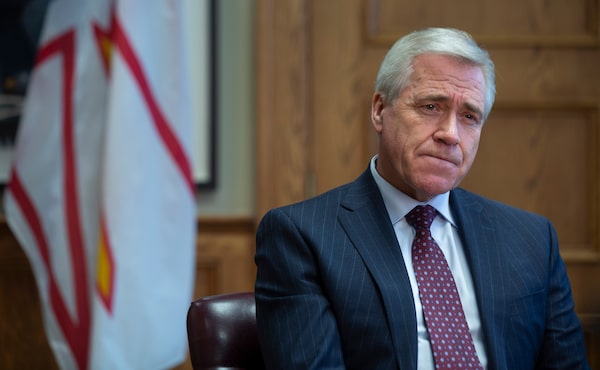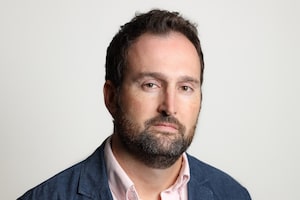
Newfoundland and Labrador Premier Dwight Ball, seen here on Feb. 18, 2020, denies he’s leaving because the road ahead will be difficult.Paul Daly/The Canadian Press
With a shrinking population, staggering debt and government spending far outstripping revenue, Newfoundland and Labrador is facing one of the biggest fiscal challenges it has seen since joining Confederation. Whoever tries to tackle that problem head-on as its next premier also stands to be a very unpopular person.
The sudden resignation of Liberal Premier Dwight Ball this week has created an opening for what may be the most difficult political job in Canada. So far, few people are stepping forward to take on the task.
“This is not a good job right now. It’s the kind of job where you’re going to be making enemies left, right and centre,” said Dr. Amanda Bittner, a professor of political science at Memorial University of Newfoundland. “You’re going to be making some tough choices that nobody is going to be happy with, and it’s probably going to be miserable. It will not be easy.”
Melissa Royle, a lawyer and host of a politics talk show in St. John’s, says the challenges facing the province are daunting, and are likely discouraging a lot of good candidates who would otherwise enter the race to replace Mr. Ball.
“Maybe that’s part of the reason we aren’t seeing a lot of people throw their hats in the ring yet,” she said. “Newfoundland and Labrador has significant demographics problems. We have an aging, declining population. We have an insurmountable debt. And our economy hasn’t really recovered since the price of oil collapsed.”
In short, the province’s books are a mess, and that could be why no member of the Liberal caucus has publicly expressed an interest in the leadership. So far, the only potential candidates who appear interested are Andrew Furey, an orthopedic surgeon who has never held elected office, and businessman Paul Antle.
Mr. Ball, 63, who announced his resignation in a surprise video this week, denies he’s leaving because the road ahead will be difficult, although quitting now allows him to avoid a June leadership vote. He says he’s stepping down because he wants to spend more time with his family.
The Premier says his successor faces an overwhelming challenge to get the province’s $14-billion debt under control, something he wasn’t able to do. Newfoundland spends more than 13 per cent of its provincial budget just on loan interest, far more than any other province, and there’s a very real concern that banks will stop lending it money.
“The financial reality in Newfoundland and Labrador, the amount of borrowing we have to do, that will be a big challenge for the next leader,” Mr. Ball said, in an interview with The Globe and Mail.
Newfoundland’s political leaders argue that the province’s growing debt crisis will soon become Canada’s problem, too. Mr. Ball is calling for a new deal with Ottawa, arguing that equalization payments from the federal government need to be increased to better reflect the cost of delivering services such as health care in his province.
His rival, official Opposition Leader Ches Crosbie, says federal equalization payments alone aren’t enough to dig Newfoundland out of the financial hole. It also needs a bigger share of offshore oil revenues, or else Ottawa risks having a province default on its debts, he said.
“This is not a handout, this is a hand up at a point in time when it’s in the national interest,” Mr. Crosbie said. “We’re in a death spiral. … We need a joint rescue plan, in view of our population collapse, otherwise we will cease to be a viable province sometime in the relatively near future.”
Demographic pressures and collapsing oil prices have hammered the economy of a province that was celebrating an energy boom just a few years ago. While the rest of Atlantic Canada is growing, Newfoundland’s population continues to decline by about 4,000 or 5,000 people a year. As it shrinks, losing younger, working-age people to other provinces, it’s getting tens of millions less in transfer funds from the federal government each year.
The minority Liberal government’s attempts to reduce spending as revenues shrink have been met with angry protests in St. John’s and around the province. With a provincial deficit that reached nearly $2-billion in 2016, Mr. Ball’s first budget as premier hiked taxes, trimmed public-sector jobs and cut libraries, prompting calls for his resignation that never went away.
One economist says the next premier will need to push further on unpopular downsizing – including cutting the public service to a sustainable level, and reducing services to Newfoundland’s network of sparsely populated remote communities spread out across the province.
“It has to start with somebody who doesn’t care about getting re-elected,” said Scott Lynch, an associate professor of economics at Memorial University of Newfoundland. “It’s going to be a nasty situation. These cuts will be extremely painful … the problem has been when things get good, they spend, and when things get bad, they still spend."
The Premier’s waning popularity was not helped by a series of patronage scandals and the ongoing saga of Muskrat Falls, the hydroelectric megaproject that’s billions of dollars overbudget and threatening to trigger a spike in electricity rates. Mr. Ball says a new rate-mitigation plan, which is still being negotiated with Ottawa, will keep those hydro bills down, and is one of his proudest achievements.
He acknowledges that his tenure as Premier wasn’t easy, but says the province is in better shape now than when he took over in December of 2015. Still, there were many reports that his caucus wanted him gone – something the premier denies. He believes that the province still has plenty of untapped potential in its natural resources, while others point to tourism and the tech sector as bright spots in the economy.
“We had lots of support in caucus, even with some of the challenging times we’ve faced as a province,” Mr. Ball said. “This is a time for renewal for the party, putting it in the hands of someone who has the energy to go into an election and do what’s best for the party and the people of the province.”
Mr. Crosbie, who hopes to replace Mr. Ball with a Progressive Conservative government, warns that unpopular decisions will be necessary to place the province on more stable footing. His late father, John Crosbie, was Canada’s fisheries minister in the Progressive Conservative government of Brian Mulroney when the northern cod fishery was closed in 1992.
That decision seriously damaged Newfoundland and Labrador’s economy, starting a pronounced migration out of the province that continues to this day. Its population is about 15 per cent less than it was when the cod moratorium began, while the rest of Canada has grown by about a third.
“It may have been unpopular, but that was ultimately the right thing to do,” Mr. Crosbie said. “Leadership requires more than following public-opinion polls. Sometimes it involves decisions that are unpopular, at least in the short term.”
Ben Eisen, a senior fellow at the Fraser Institute, a right-wing think tank, said there are models that the province can follow to turn itself around. In the early 1990s, Saskatchewan was at risk of defaulting on its debts, but managed to avoid insolvency by significantly cutting spending and reducing the size of the government, he said.
“You’ve got a very worrisome picture in Newfoundland and Labrador,” he said. “There’s no simple solution. But all you have to do is look at history and realize this is not the first time a government in Canada has faced a very serious fiscal challenge."
Our Morning Update and Evening Update newsletters are written by Globe editors, giving you a concise summary of the day’s most important headlines. Sign up today.
 Greg Mercer
Greg Mercer